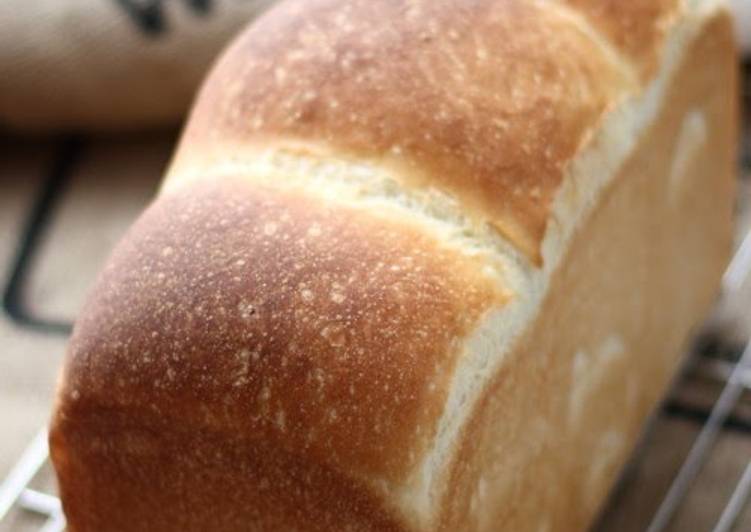An Everyday Shokupan Square Loaf Bread. Great recipe for An Everyday Shokupan Square Loaf Bread. I wanted to make a simple, neutral ordinary bread to eat every day, so I substituted half the butter with vegetable oil to cut down on the base costs a bit. This shokupan is easy to make and we never get tired of it.
 Unmold and transfer the bread to a cooling rack.
Wait till it completely cools down before slicing.
Shoku Pan is a Japanese square loaf bread that is often eaten as toast or used for sandwiches.
You can cook An Everyday Shokupan Square Loaf Bread using 9 ingredients and 13 steps. Here is how you cook that.
Unmold and transfer the bread to a cooling rack.
Wait till it completely cools down before slicing.
Shoku Pan is a Japanese square loaf bread that is often eaten as toast or used for sandwiches.
You can cook An Everyday Shokupan Square Loaf Bread using 9 ingredients and 13 steps. Here is how you cook that.
Ingredients of An Everyday Shokupan Square Loaf Bread
- Prepare of Bread (strong) flour.
- Prepare of Cake flour.
- It's of Skim milk powder.
- It's of White castor or superfine sugar.
- You need of Salt.
- You need of Dry yeast.
- You need of Water.
- You need of Unsalted butter.
- It's of Vegetable oil.
Although rice is the biggest staple food in Japan, Shoku Pan bread today may be the most popular breakfast item. Shoku Pan is very soft and tender and delicious, and you will love it if you like Japanese bread. I am lucky to have the opportunity to study in Japan, and my stay there was further enriched by the unique and interesting food culture. Despite the array of food varieties there, there was one thing that I would have everyday, and it was none other than the humble shokupan (bread loaf).
An Everyday Shokupan Square Loaf Bread instructions
- Put all the ingredients in a bread machine and knead until the gluten develops. I took it out of the machine once the kneading was done and rounded off the dough before the 1st rising. Check with a finger to see if it has risen enough (a hole made floured finger should not bounce back)..
- Take the dough out and deflate. Divide into 2 to 3 portions, and round off each piece so that the surface is taut and smooth and pinch the seams closed. Cover with plastic wrap and rest for 10 minutes..
- When the dough has rested, deflate it again and roll out about 20 to 25 cm square. Fold into thirds lengthwise, roll up from the near side, and pinch the rolled end closed..
- Put the dough pieces in an oiled bread pan. Cover with plastic wrap and use your oven's bread-rising setting to let the dough rise for 40 to 50 minutes at 30-40°C (2nd rising)..
- If you want a square loaf let the dough rest to about 80% of the height of the pan. If you want a loaf with a rounded top, let it rise until it's risen a bit higher than the rim..
- Preheat the oven to 180°C. When the oven has heated up, bake the bread for 30 minutes at 180°C and it's done. If it looks like the top is browning too fast, cover with a piece of foil..
- As soon as it comes out of the oven, drop the bread pan and all from about a 30 cm height to push out the steam. Take the loaf out of the pan..
- Dense and bouncy and yet light and fluffy. The result is a bread with a lasting moist, tender texture!.
- This one is baked in a square shokupan pan. I turned this into sandwiches for an outing. Since the bread stays moist and soft, it was great even after some time had passed..
- This is a version with bacon and melting type cheese rolled into the dough..
- .
- The version in the top photo was made with my own homemade started. I used 150 g of starter and 220 ml of water..
- When the bread has cooled down completely, I slice it into pieces and keep it in bags. It's moist and soft the next day..
Spray one loaf bread tin lightly and place the rolled dough in the end of the tin facing the centre. Soft as clouds, white as snow, Japanese milk bread is the tender everyday loaf we want to bake right now. The precision required is an excellent excuse to buy a scale, but if you still want to. Place dough, top-side down, on lightly floured work surface to deflate. Fold bottom edge two thirds of the way up, and fold again so that the top edge meets the bottom edge as you would a business letter.